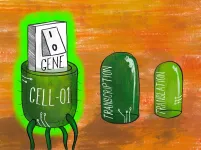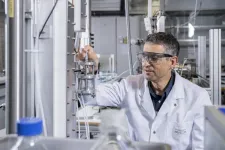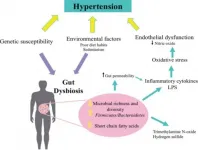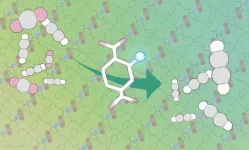Bioengineers learn the secrets to precisely turning on and off genes
2021-03-19
(Press-News.org) In a recent study led by the University of Bristol, scientists have shown how to simultaneously harness multiple forms of regulation in living cells to strictly control gene expression and open new avenues for improved biotechnologies.
Engineered microbes are increasingly being used to enable the sustainable and clean production of chemicals, medicines and much more. To make this possible, bioengineers must control when specific sets of genes are turned on and off to allow for careful regulation of the biochemical processes involved.
Their findings are reported today in the journal Nature Communications.
Veronica Greco, lead author and a Royal Society funded PhD student at Bristol's School of Biological Sciences, said: "Although turning on or off a gene sounds simple, getting a living cell to do it on command is a real challenge. Every cell is slightly different, and the processes involved are not 100 percent reliable."
To solve this issue, the team took inspiration from nature where key events are often controlled by multiple processes simultaneously.
Veronica Greco added: "If you look at a Venus flytrap you find that a trap will only close when multiple hairs are triggered together. This helps reduce the chance of a trap closing by accident. We wanted to do something similar when controlling the expression of a gene inside a cell, adding multiple-levels of regulation to ensure it only comes on precisely when we want it to."
Professor Claire Grierson, co-author and Head of the School of Biological Sciences at Bristol, added: "What was wonderful about this project was how well it worked to harness two of the core processes present in every cell and underpinning all of life - transcription and translation."
The team showed that by using this type of multi-level regulation, they could create some of the most high-performance switches for gene expression built to date.
Moreover, working in collaboration with Dr Amir Pandi and Prof Tobias Erb from Bristol's Max Planck Institute for Terrestrial Microbiology, the team were able to go a step further. They demonstrated that even when used outside of living cells, these multi-level systems offered some of the most stringent control over gene expression yet seen.
Dr Thomas Gorochowski, senior author and a Royal Society University Research Fellow at Bristol, said: "When we engineer microbes, we often try to simplify our systems as much as possible, thinking we'll have better control over what is happening. But what we've shown is that embracing some of the inherent complexity of biology might be the key to fully unlocking its potential for the high-precision biotechnologies of tomorrow."
INFORMATION:
The study was funded by the Royal Society, Max Planck Society, European Molecular Biology Organization (EMBO), BBSRC and EPSRC with support from the Bristol BioDesign Institute (BBI)
[Attachments] See images for this press release:

ELSE PRESS RELEASES FROM THIS DATE:
2021-03-19
Scientists have discovered in more detail than ever before how the human body's immune system reacts to malaria and sickle cell disease.
The researchers from the universities of Aberdeen, Edinburgh, Exeter and Imperial College, London have published their findings in Nature Communications.
Every year there are ~200 million cases of malaria, which causes ~400,000 deaths.
As it causes resistance against malaria, the sickle cell disease mutation has spread widely, especially in people from Africa.
But if a child inherits a double dose of the gene - from both mother and father - they will develop ...
2021-03-19
Researchers at the Paul Scherrer Institute PSI have for the first time observed photochemical processes inside the smallest particles in the air. In doing so, they discovered that additional oxygen radicals that can be harmful to human health are formed in these aerosols under everyday conditions. They report on their results today in the journal Nature Communications.
It is well known that airborne particulate matter can pose a danger to human health. The particles, with a maximum diameter of ten micrometres, can penetrate deep into lung tissue and settle ...
2021-03-19
Sabrina L. Spencer, PhD, is a CU Boulder researcher and a CU Cancer Center member. Spencer recently won two awards: the Damon Runyon-Rachleff Innovation Award (from the Damon Runyon Cancer Research Foundation) and the Emerging Leader Award (from The Mark Foundation for Cancer Research). The preliminary research she used to apply for the grants, "Melanoma subpopulations that rapidly escape MAPK pathway inhibition incur DNA damage and rely on stress signalling," was published in Nature Communications on March 19, 2021. We spoke to Spencer about the awards and how she plans to use them to ...
2021-03-19
Researchers looking at miniscule levels of plutonium pollution in our soils have made a breakthrough which could help inform future 'clean up' operations on land around nuclear power plants, saving time and money.
Publishing in the journal Nature Communications, researchers show how they have measured the previously 'unmeasurable' and taken a step forward in differentiating between local and global sources of plutonium pollution in the soil.
By identifying the isotopic 'fingerprint' of trace-level quantities of plutonium in the soil which matched the ...
2021-03-19
A study of Japanese university students and recent graduates has revealed that writing on physical paper can lead to more brain activity when remembering the information an hour later. Researchers say that the unique, complex, spatial and tactile information associated with writing by hand on physical paper is likely what leads to improved memory.
"Actually, paper is more advanced and useful compared to electronic documents because paper contains more one-of-a-kind information for stronger memory recall," said Professor Kuniyoshi L. Sakai, a neuroscientist at the University of Tokyo and corresponding author of the research recently published in Frontiers in Behavioral Neuroscience. The research was completed with collaborators from the NTT Data Institute of Management Consulting.
Contrary ...
2021-03-19
Philadelphia, March 19, 2021 - In recent years, fermented dairy foods have been gaining attention for their health benefits, and a new review published in the Journal of Dairy Science indicates these foods could help reduce conditions like hypertension (high blood pressure). A team of investigators from the Center for Food Research and Development in Sonora, Mexico, and the National Technological Institute of Mexico in Veracruz reports on numerous studies of fermented milks as antihypertensive treatments and in relation to gut microbiota modulation. They also examine the potential mechanistic pathways of gut modulation through antihypertensive fermented milks.
In addition to the impact of genetics and the environment, there is growing ...
2021-03-19
During the first six months of the pandemic, as people attempted to stay away from hospitals caring for those sick with COVID-19, potentially avoidable hospitalizations for non-COVID-19-related conditions fell far more among white patients than Black patients, according to a new study that looked at admissions to UCLA Health hospitals.
The findings indicate that the COVID-19 crisis has exacerbated existing racial health care disparities and suggest that during the pandemic, African Americans may have had worse access than whites to outpatient care that could have helped prevent deterioration of their non-COVID-19 health conditions, said Dr. ...
2021-03-19
LA JOLLA, CALIF. - March 19, 2021 - Scientists at Sanford Burnham Prebys Medical Discovery Institute have identified a drug candidate that blocks the uptake of glutamine, a key food source for many tumors, and slows the growth of melanoma. The drug is a small molecule that targets a glutamine transporter, SLC1A5, which pumps the nutrient into cancer cells--offering a promising new approach for treating melanoma and other cancers. The study was published in the journal Molecular Cancer Therapeutics.
"While great strides have been made recently in the treatment of melanoma, many patients' tumors become resistant to therapy, and this has become a major obstacle in the successful treatment of the disease," says Ze'ev ...
2021-03-19
A more energy-efficient method improves how an industrial gas is purified by reversing the traditional process. The concept was developed and successfully tested by scientists at Kyoto University's Institute for Integrated Cell-Material Sciences (iCeMS) in Japan and colleagues. The findings were reported in the journal Angewandte Chemie International Edition.
Acetylene is a gas used in many industries, including as a fuel in welding and a chemical building block for materials like plastics, paints, glass and resins. To produce acetylene, it first needs to be purified from carbon dioxide. Traditionally, this is done by passing the acetylene/carbon ...
2021-03-19
Colorectal cancer survivors who maintained a stable body weight but lost muscle and developed fatty deposits in their muscles faced a 40 percent higher risk of premature death than patients who avoided both health issues.
"The conventional wisdom has been that colorectal cancer patients should avoid losing or gaining weight during treatment," said Dr. Justin C. Brown, Assistant Professor and Director of the Cancer Metabolism Program at Pennington Biomedical Research Center. "But maintaining your weight does not mean your body composition remains the same. Muscle can ...
LAST 30 PRESS RELEASES:
[Press-News.org] Bioengineers learn the secrets to precisely turning on and off genes






